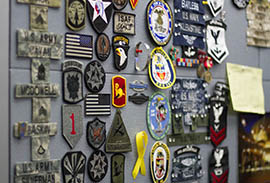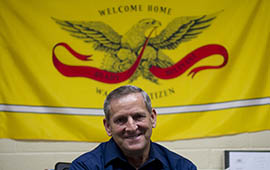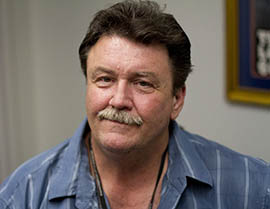Cronkite News has moved to a new home at cronkitenews.azpbs.org. Use this site to search archives from 2011 to May 2015. You can search the new site for current stories.
Lawmaker seeks funds to expand Arizona’s veterans supportive campuses
GLENDALE – As soon as Ammon Rowley separated from the Navy, he wanted to start his education.
He didn’t want to start at a university, though, which is why he found himself at Glendale Community College completing his associate degree.
“I have problems with crowds and really bad anxiety, so I wanted to start smaller and build up from there,” Rowley said.
The smaller campus at GCC combined with a stand-alone Veterans Services Center allowed him to ease back into education after serving five years.
“Getting set up with my classes is always really easy. I just pop in here and it’s done,” he said.
Like their four-year counterparts, community colleges are expanding services for veterans. Under a 2012 state law, GCC is seeking certification as an Arizona veterans supportive campus, a status that all three public universities already have.
Rep. Ethan Orr, R-Tucson, is working to expand this even further.
He authored HB 2177, which would give $500,000 in fiscal 2015 to the Arizona Department of Veterans’ Services to establish supportive campuses for veterans and to provide resources for veterans’ benefits counselors.
“What we’re trying to do is work with all the community colleges and all the universities to help people, upon separation, transition and succeed at community college,” Orr said. “This bill does have an appropriations, it does work with the (Arizona) Department of Veterans’ Affairs, but more than that this bill is a conversation starter.”
Orr’s bill was assigned to the House Committee on Higher Education and Workforce Development but has yet to receive a hearing.
According to the Department of Veterans’ Services, a veteran supportive campus is a post-secondary education institution that, among eight requirements, offers: student veteran orientation programs; peer mentoring and peer support programs for student veterans; and sensitivity and awareness training on military and veterans’ culture, including challenges such as post-traumatic stress disorder.
Other community colleges are working to meet the requirements, including Scottsdale Community College, according to Dave Hampton, spokesman for the Arizona Department of Veterans’ Services.
Hampton said department officials are excited about the increased attention on veterans’ education at the community college level.
“It’s good to have a place on campus where they can get everything done at once,” he said. “I think community college are really working to be veteran supportive campuses.”
The expanded offerings by GCC are aimed at helping students like Rowley achieve their academic goals, be it professional certification, an associate degree or credits to transfer.
Charles Pierce, GCC’s veterans coordinator, spent 25 years in the Air Force and has been working with veterans since he got out in 1997.
“When we started out, my responsibilities were much like a certifying official,” he said. “But everything evolved from that where more and more of our students – that was right around Desert Storm and then 9/11 kicked off – and new programs kicked off as a result of that,” Pierce said.
GCC’s programs have continued to grow. Chris Spicer, GCC’s veteran advocate, said the process starts at an orientation specifically for veterans that explains their Department of Veterans Affairs benefits and acclimates them to campus. At the center, students are given priority registration, can meet with different advisers for degree planning, financial aid and education benefits as well as network with other veterans.
“It’s unusual to have military-minded counselors. Most of your schools are for general population, but we do have counselors here that understand military situations,” Spicer said. “We have a unique possibility he said to provide every means possible that we can do for our veterans.”
At Scottsdale Community College, Dean of Students Gia Taylor pointed to an advisory board comprised of both faculty, students and staff, both veterans and civilians.
“What we’re doing is looking at the kind of programming that we offer for veterans to look at ways that we can improve that, to improve opportunities for veterans to begin to acculturate back into civilian life,” Taylor said.
The college is in the process of hiring peer coaches for student veterans to provide another person for student veterans to ask questions and seek advice.
“Be somebody they can turn to if they’re experiencing some difficulty – and everybody does as a new student,” she said. “There’s always bumps in the road particularly you’re first-generation going to college.”









